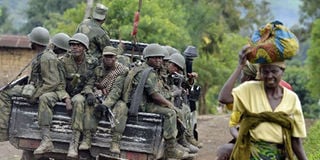Congo ceasefire collapses before it begins

Democratic Republic of Congo's regular army soldiers sit at the back of a pick-up truck as they head towards the Mbuzi hilltop, near Rutshuru, on November 4, 2013, after the army recaptured the area from M23 rebels.
The ceasefire negotiated in Luanda between Rwanda and the Democratic Republic of Congo (DRC) appears to have collapsed before it could take effect, following an outbreak of violence between the warring parties.
Despite committing to a periodic ceasefire from August 4, M23 rebels began advancing and capturing new towns in eastern DRC, notably Nyamilima and Ishasha, just as the ceasefire was coming into effect.
The movement contradicted a July 30 pledge by Rwanda and the DRC, brokered by Angolan President Joao Lorenco, to halt fighting between the M23 and Congolese forces, the FARDC, for about two weeks.
Rwanda is accused by Kinshasa of supporting the M23 rebels, while Kigali accuses the DRC of supporting the FDLR rebels, who are seen as trying to destabilise the Rwandan state. Angola has therefore often advocated direct state-to-state talks between Rwanda and the DRC as a longer route to ending the violence in eastern DRC.
Adam Chalwe, a member of the Alliance Fleuve Congo (Congo River Alliance), a coalition to which M23 belongs, claimed on Tuesday that the rebels have "an unshakable will to liberate the Congolese people".
According to the final communiqué of the July 30 negotiations in Luanda, intelligence experts from Angola, Rwanda and the DRC were due to meet in Luanda on Wednesday August 7 to continue work on consolidating peace efforts in the DRC and the region.
However, statements from the warring parties indicate that the war will continue despite the deteriorating situation in North Kivu and the increasing number of people in need of humanitarian aid.
In an interview on Tuesday 6 August from Brussels, where he is staying, President Félix Tshisekedi definitively ruled out any negotiations with the armed groups M23 and AFC. He had said this before, although he had often promised to meet his Rwandan counterparts.
“As long as I am president, I will never face the M23 or the AFC (Congo River Alliance),” he declared. The Congolese head of state also made it clear that it was Rwanda that requested the ceasefire, not the DRC. “It was Rwanda that requested the ceasefire, not us.”
On the ground, according to the United Nations Mission for the Stabilisation of Congo (MONUSCO), after four weeks of relative cessation of fighting, due to the double “humanitarian truce” proposed by the United States of America, the rebels have violated their commitments to peace.
“MONUSCO strongly condemns the violation of the ceasefire of 4 August by the March 23 Movement (M23) with the capture of Ishasha (North Kivu/DRC). This violation compromises stabilisation efforts in the region and runs counter to the agreement signed in Luanda on 30 July 2024", read a statement from the peacekeeping mission in the DRC.
The rebels themselves say that they are not "automatically bound by the Luanda negotiations" of 30 July. They see these negotiations as talks on "a bilateral level between two states, the DRC and Rwanda, under the aegis of Angola". This may certainly explain the resumption of fighting in Kivu.
Between August 3 and 4, some civil society actors reported violent clashes between M23 and local armed groups in the localities of Kiseguru, Katwiguru and Kisharo, where at least eight civilians were killed, and some inhabitants fled to Uganda, together with some Congolese police officers.
The US had earlier brokered a two-week ceasefire that lasted until Sunday. In that, too, sporadic fighting was seen even though it was meant to allow humanitarian supply to the displaced.





